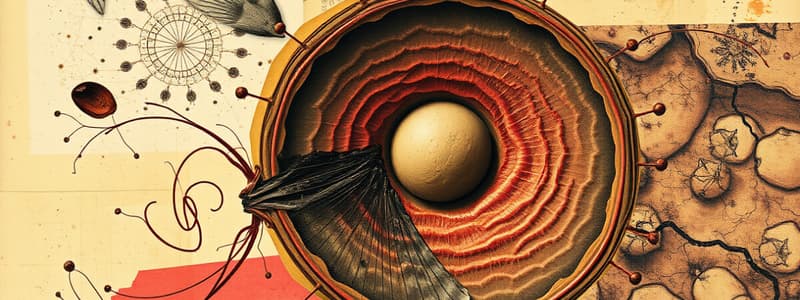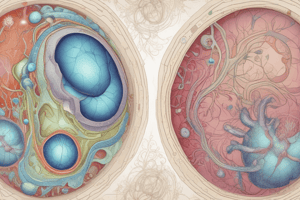Podcast
Questions and Answers
What is the initial structure formed from the ectoderm that develops into nervous tissue?
What is the initial structure formed from the ectoderm that develops into nervous tissue?
- Neural folds
- Neural tube
- Neural groove
- Neuroectoderm (correct)
During the formation of the neural tube, what occurs after the neural folds meet?
During the formation of the neural tube, what occurs after the neural folds meet?
- They differentiate into mesoderm
- They fuse to create the neural tube (correct)
- They migrate to form somites
- They develop into the neural crest cells
Which embryonic layer is responsible for the formation of somites?
Which embryonic layer is responsible for the formation of somites?
- Neuroectoderm
- Endoderm
- Ectoderm
- Mesoderm (correct)
What process leads to the development of the neural plate into the neural tube?
What process leads to the development of the neural plate into the neural tube?
What are the specialized cells that migrate from the neural folds during development?
What are the specialized cells that migrate from the neural folds during development?
At what stage does the mesoderm start to divide into cuboidal segments?
At what stage does the mesoderm start to divide into cuboidal segments?
What major developmental process occurs during the fourth week of embryonic development?
What major developmental process occurs during the fourth week of embryonic development?
The central band of cells extending the length of the embryo during early development is known as what?
The central band of cells extending the length of the embryo during early development is known as what?
What is the significance of the primitive streak in embryonic development?
What is the significance of the primitive streak in embryonic development?
Which two layers compose the bilaminar embryonic disc?
Which two layers compose the bilaminar embryonic disc?
What does the mesoderm layer primarily give rise to in embryonic development?
What does the mesoderm layer primarily give rise to in embryonic development?
During which week does the central nervous system (CNS) begin to develop?
During which week does the central nervous system (CNS) begin to develop?
What type of cells differentiate from the ectoderm to become part of the nervous system?
What type of cells differentiate from the ectoderm to become part of the nervous system?
What characterizes the cephalic end of the trilaminar disc?
What characterizes the cephalic end of the trilaminar disc?
What does proliferation primarily involve during the embryonic period?
What does proliferation primarily involve during the embryonic period?
What occurs during cell migration in the context of gastrulation?
What occurs during cell migration in the context of gastrulation?
Which layer is formed from the remaining epiblast after gastrulation creates the mesoderm?
Which layer is formed from the remaining epiblast after gastrulation creates the mesoderm?
Which process occurs last in the sequence of embryonic physiological processes?
Which process occurs last in the sequence of embryonic physiological processes?
Cytodifferentiation specifically refers to the development of:
Cytodifferentiation specifically refers to the development of:
What characterizes the bilaminar embryonic disc developed from the blastocyst?
What characterizes the bilaminar embryonic disc developed from the blastocyst?
Morphodifferentiation is essential for the development of:
Morphodifferentiation is essential for the development of:
Which type of growth describes tissue enlarging by adding layers from within?
Which type of growth describes tissue enlarging by adding layers from within?
During the process of maturation, which aspects are combined?
During the process of maturation, which aspects are combined?
What type of growth results in the enlargement of tissue by the addition of layers on the surface?
What type of growth results in the enlargement of tissue by the addition of layers on the surface?
Flashcards are hidden until you start studying
Study Notes
Embryonic Layers and Development Overview
- The embryo begins as a bilaminar disc, consisting of two layers: the superior epiblast (high columnar cells) and the inferior hypoblast (small cuboidal cells).
- During the third week, the primitive streak develops in the bilaminar embryonic disc, marking the onset of gastrulation, which leads to the formation of three germ layers.
Gastrulation Process
- The primitive streak is characterized by a rod-shaped thickening, facilitating bilateral symmetry, dividing the disc into distinct right and left halves.
- Cell migration results in the formation of the mesoderm layer, transforming the bilaminar disc into a trilaminar embryonic disc.
- The epiblast layer becomes ectoderm, while the hypoblast layer is redefined as endoderm.
Cephalic End and Membrane Formation
- The trilaminar disc has a defined cephalic end where the oropharyngeal (buccopharyngeal) membrane forms, consisting solely of ectoderm and endoderm, without mesoderm.
CNS Development
- By the end of the third week, the central nervous system (CNS) begins to develop, starting from neuroectoderm, which differentiates from the ectoderm.
- The neural plate, forming from neuroectoderm, extends from the cephalic to caudal end of the embryo and undergoes invagination to create the neural groove, leading to the formation of the neural tube.
Neural Crest Cells
- Neural crest cells, considered the fourth embryonic layer, develop from the neuroectoderm and migrate from the crests of the neural folds, eventually contributing to specific oral structures.
Somite Formation
- As the mesoderm differentiates, it divides into 38 paired cuboidal segments called somites, located alongside the developing CNS, which will form the vertebral plate.
Embryonic Folding and Axis Establishment
- In the fourth week, embryonic folding occurs, establishing the axis of the embryo and organizing tissue types for further development, resulting in a somewhat tubular shape.
Developmental Physiological Processes
- Induction is the first physiological process, involving intercellular actions where one group of cells influences another, often initiated by chemical precursors.
- Following induction, proliferation occurs through appositional (adding layers to the outside) and interstitial growth (adding layers from within).
- Differentiation leads to the specialization of embryonic tissues into various types, including cytodifferentiation (cell types), histodifferentiation (tissue types), and morphodifferentiation (organ structure).
Maturation of Embryonic Structures
- Maturation encompasses proliferation, differentiation, and morphogenesis, exemplified by the development of ectodermal cells into the tooth germ and eventually into a tooth.
Studying That Suits You
Use AI to generate personalized quizzes and flashcards to suit your learning preferences.




